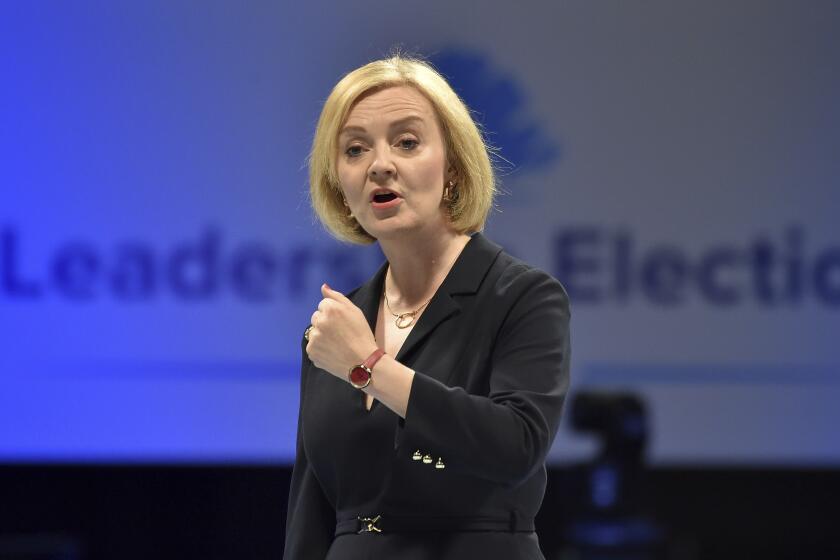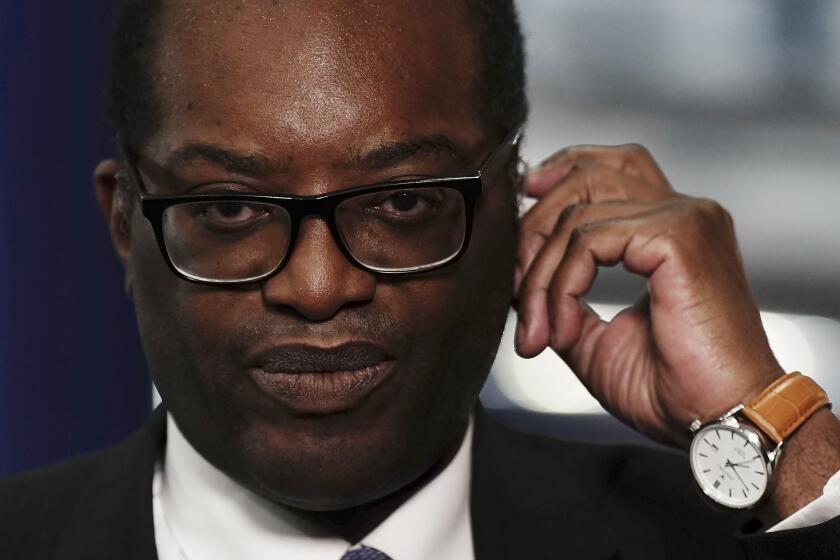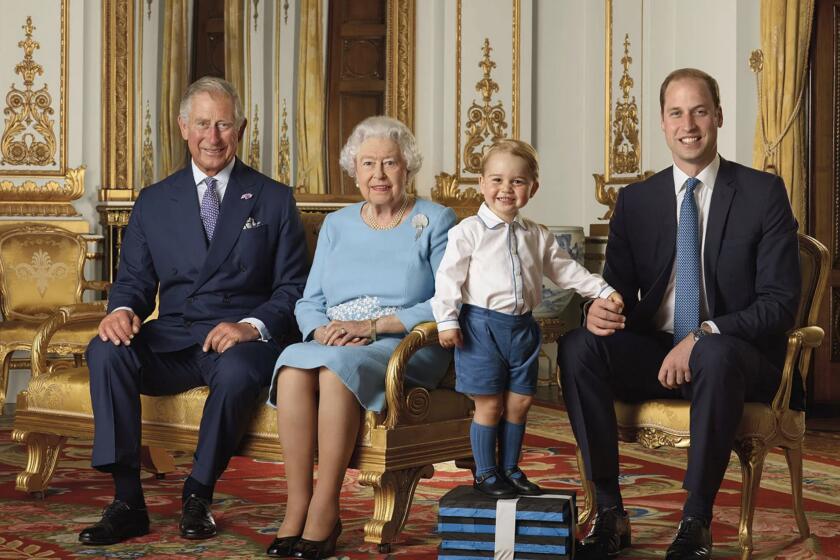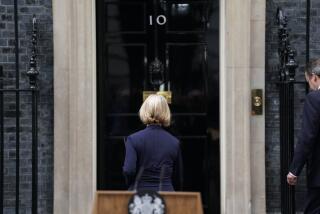It’s a good time to be an American in Britain, as the pound declines in value
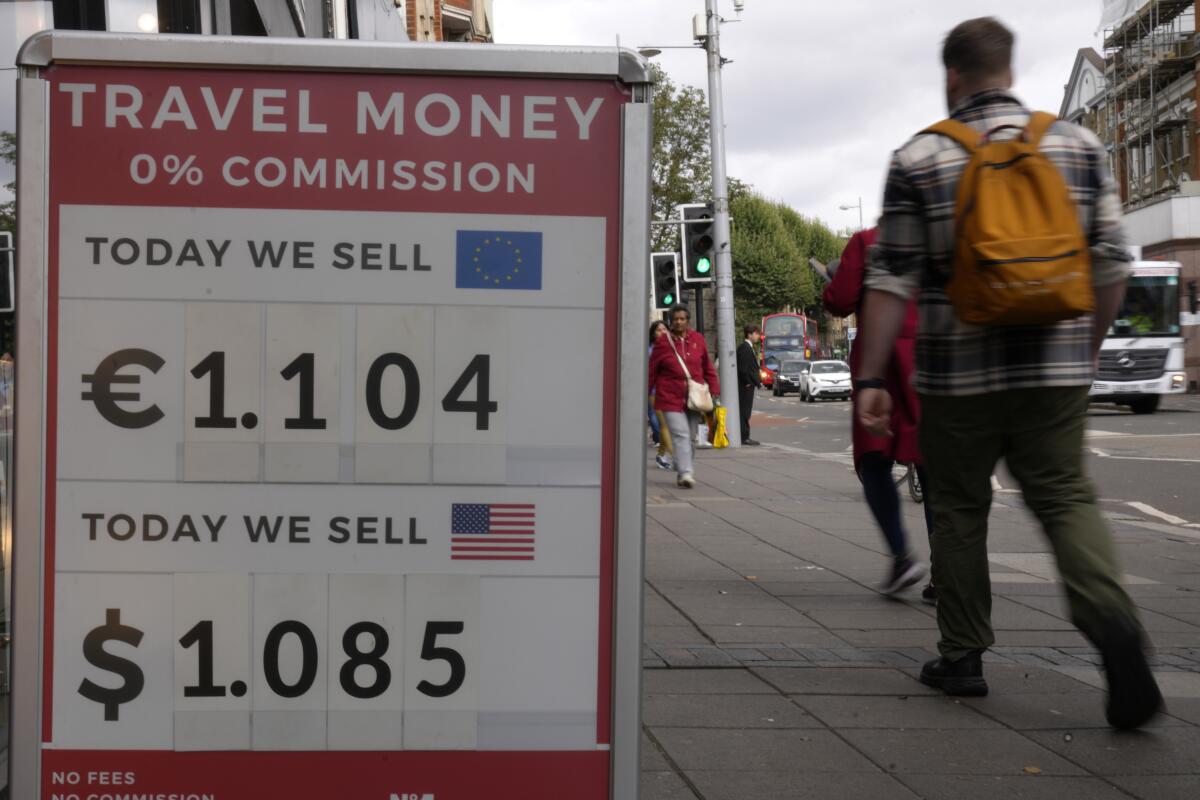
- Share via
LONDON — When Julian Asher moved from New York to London 16 years ago to work as a management consultant, his six-figure salary stopped going so far. The British pound, worth twice as much as the dollar, was at a historic high.
It was “close to $25 for a quick lunch” at his local sandwich shop, Asher said. “I was mentally doubling every cost in my head.”
So as the pound came tumbling down in recent weeks, Asher kept a close eye on exchange rates — and eventually transferred $20,000 from his U.S. savings account to his U.K. bank at a near-equal exchange rate to fund an extensive kitchen renovation he had long put off.
The pound, long one of the world’s strongest currencies, a source of pride for Brits and one of distress for tourists and newly arrived immigrants, is today a shell of its former self. Since hitting an all-time low last month of 1 pound to $1.03, it’s made little recovery and hovers around $1.10, one of its lowest values in decades.
As the Guardian newspaper recently put it, the British “jewel has lost its shine.”
The tarnishing started in earnest six years ago when Britain voted to leave the European Union. Its currency has steadily declined as markets question the economic wisdom of the decision, which has made once-near-seamless trade with neighboring countries costly and complicated. The pound was worth $1.44 before the Brexit referendum in June 2016. It’s lost about a quarter of its value since.
Britain’s currency fell to its lowest value against the dollar amid concern over the economic policies of the government of Prime Minister Liz Truss.
Then came the pandemic — Britain is the only nation among the Group of 7 industrialized democracies whose economy has not recovered to pre-pandemic levels — and now there are the policies of the new British government.
After replacing Boris Johnson as leader last month, Conservative Prime Minister Liz Truss vowed to cut tens of billions of dollars in taxes — including for the richest earners — but failed to spell out how Britain would recoup the lost revenue. That sent investors fleeing the pound in droves and the currency plummeting to its historic low before an extraordinary intervention by the Bank of England helped stabilize it.
A strong dollar across the board — spurred by a U.S. Federal Reserve hike of interest rates to combat inflation — has only made things worse. The greenback has also hit highs against the euro, the Japanese yen and the Chinese renminbi as investors seek a safe haven amid the global political and economic turmoil resulting from Russia’s war in Ukraine.
In the U.K., which is struggling with a cost-of-living crisis and staring at a dark winter of record fuel costs, the multiple blows have led to predictions of a recession. Some economists say the country has already entered one; new figures Wednesday showed that the British economy contracted by 0.3% in August.
The British government has dropped plans to cut income tax for top earners after defending the proposal for days.
But for many of the 166,000 Americans who call the U.K. home, along with the 4 million who visit each year, the switch in currency fortunes has changed the calculus of life and travel abroad in a positive direction.
“It’s a rare chance to actually be on the better side of the money equation as an American in London,” said Asher, 48, who grew up in the San Francisco Bay Area and today runs a luxury travel company. He considers himself lucky: Many of his clients pay in dollars, and he owns an investment property in the San Francisco Bay Area that he rents out in dollars.
For Emily Ashleigh, an American visiting the British capital, the incredibly shrinking pound has also been a boon.
“I had budgeted $2,000 for a few days between the hotel, eating out and shopping,” said Ashleigh, 27, who traveled from Arizona with friends and strolled last week along Oxford Street, a major shopping destination lined with souvenir shops, department stores and global outlets like Uniqlo, the Disney Store and Adidas. “But that was a few months ago when I was planning, and the pound was worth more. Now, instead of one drink out at a restaurant, I can get two.”
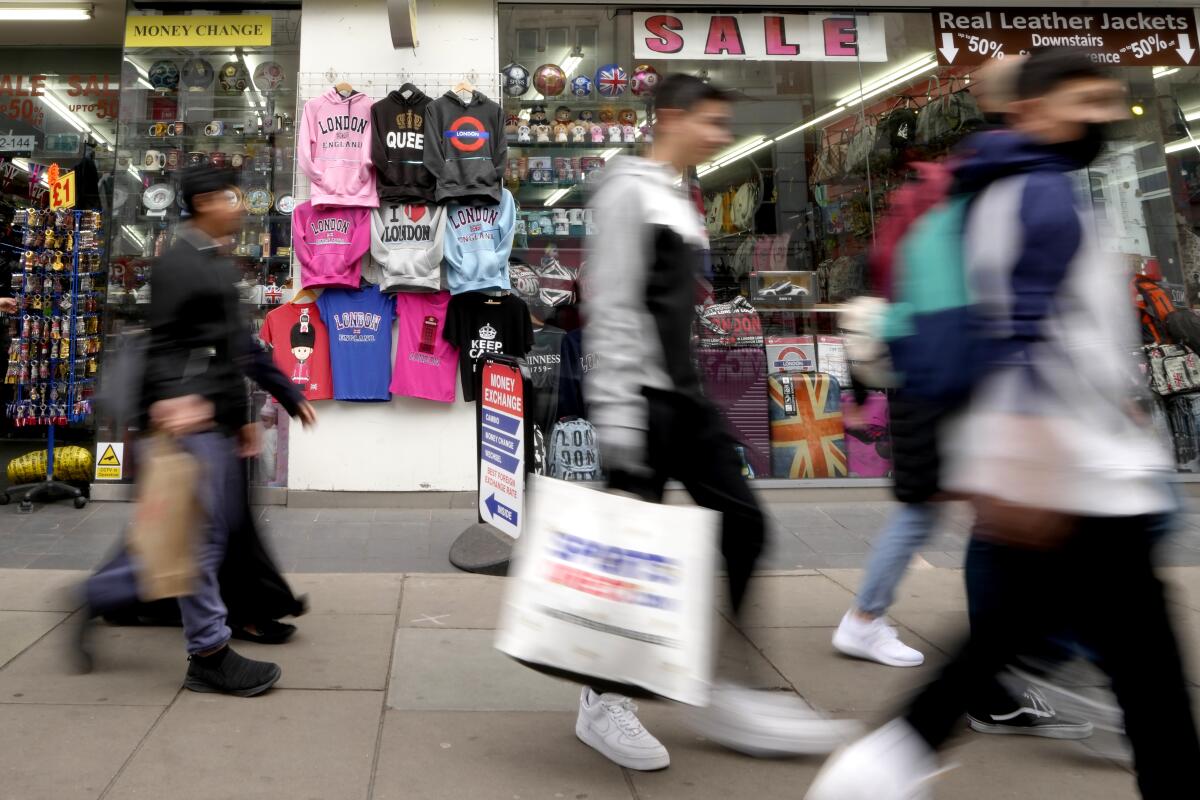
The situation is reversed for her British friend Beatriz Gonzalez, who will be touring New York and the West Coast in January and is already dreading the costs.
“I booked a boutique hotel in Tribeca, which is something I can afford for a few days when the pound is doing better,” said Gonzalez, who works in finance.
“I do not anticipate the pound going anywhere positive. So I changed my booking to the Holiday Inn.”
Justin Yoo, an American who has lived off and on in London since first arriving as a student in 1994 — when the pound was around $1.50 — said its drop in value made him feel “almost a little ripped off.”
“I’ve been in multiple graduate programs in London, and it’s always felt like it costs so much to pay your student loans as an American because the tuition would sometimes be twice the amount when you converted it to dollars,” said Yoo, a doctoral candidate in Egyptology at University College London. “Students coming in today, meanwhile, are getting a deal, and I’m happy for them.
Barring tragedy or revolution, Britain is set to have a man instead of a woman on the throne for the next 75 years at least.
“I feel bad for British people, who are the ones really struggling,” Yoo added. “At least I have an academic editing job that pays me in dollars, so I can get by.”
The plunging pound is a blow to the U.K.’s prestige as well as its pocketbook. The pound is inextricably bound up in British identity; when the country belonged to the EU, it demanded — and received — an exemption from having to adopt the euro. But the currency’s poor performance of late has dented the sense of British superiority.
“The pound has been part of a wider understanding of Britain’s power and sense of self,” said David Cobham, an economics professor at Heriot-Watt University in Scotland who studies monetary policy. “But what is happening is that the chickens are coming home to roost because of economic decisions over the years.”
Ahead of the busy travel season including Thanksgiving and Christmas, the pinched pound is already on the mind of Suki Fuller, an American whose job in London as an intelligence advisor pays her in pounds.
News Alerts
Get breaking news, investigations, analysis and more signature journalism from the Los Angeles Times in your inbox.
You may occasionally receive promotional content from the Los Angeles Times.
“Going back to the U.S. used to always be about two things for me: seeing family and shopping,” said Fuller, 50, who has lived abroad for much of her adult life. “I’d go to T.J. Maxx, Marshalls and Macy’s because the selection was better than in London, and it would seem like a steal with the conversion rate since I’d get paid in pounds. Not anymore.”
Afeef Ahmed, an Amazon worker who moved from the Bay Area to London last year and who also earns in pounds, is now rethinking travel back to the U.S. in favor of shorter-haul trips on a tighter budget.
Ahmed, 34, said he and his wife sometimes joke “that we came to the U.K. during its downfall.”
“It’s not just the economic downfall and Boris Johnson getting kicked out, but the queen dying, it hitting 104 degrees over the past summer. I think we are probably well past ‘peak U.K.,’” said Ahmed. “Maybe by the end of my lifetime the U.K. will be more like a Second World country.”
More to Read
Sign up for Essential California
The most important California stories and recommendations in your inbox every morning.
You may occasionally receive promotional content from the Los Angeles Times.

